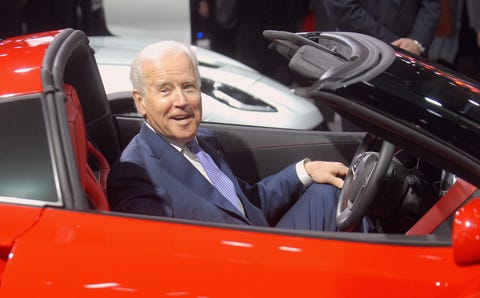
The Shanghai, China, auto show took place in person this week. Attendees wore masks, concept cars rotated on plinths, but the big story was a disgruntled Tesla owner who stood on top of a Model 3 wearing a T-shirt that read “The brakes don’t work” in a protest over the company’s handling of a crash the protester and her family were involved in. Tesla eventually issued an apology and pledged to do more to ensure quality, but China’s state news agency said the apology fell short and blamed the issues on an unnamed “problematic senior executive.” Your move, Musk.
This Week in Sheetmetal
There was a lot of other EV news out of Shanghai, but let’s start with something louder. Spy video revealed the glorious noise of the forthcoming Ford F-150 Raptor, which we expect to be powered by a version of Ford’s Predator V-8, probably making more than the 702 horsepower offered by the Raptor’s main rival, the Ram 1500 TRX.
Back in Shanghai, Ford offered up the Evos, a concept and Mach-E look-alike. Ford says the Evos was designed specifically for the China market, but it seems like it might also be a good fit for the Fusion-sized hole in the U.S. lineup.
The Cadillac Lyriq EV made its official debut this week. Cadillac says it will never debut a new ICE model again. But don’t mourn for the Escalade just yet: the company will continue to offer mid-cycle updates to its existing gasoline-powered vehicles.
Toyota, too, signaled a shift to EVs. It showed its bZ4X EV concept, a roughly RAV4-sized crossover promised for production in 2022. This marked the first of seven Toyota models that will bear the bZ prefix, which stands for Beyond Zero. We also expect an electric pickup to be part of the family.
When it Rains
The trouble at the Shanghai auto show may have been the least of Tesla’s worries this week, as a string of public relations disasters struck closer to home. Last weekend, two people died when a Model S crashed into a tree and caught fire in a residential area of Houston, Texas. Police said no one was in the driver’s seat at the time of the crash, but Elon Musk insisted on Twitter that Autopilot could not have been engaged for various reasons, including that the tech requires there be a driver at attention.
Not so, said Consumer Reports, after tests of its own Model Y at a closed track proved the car would operate without a driver, and that it did not sound any alarms or go into a limp mode when Autopilot was engaged with no one in the driver’s seat. Now the police department involved with the Texas crash, the National Transportation Safety Board (NTSB), and the National Highway Traffic Safety Administration (NHTSA) have all pledged to investigate the crash, and a pair of senators asked NHTSA to also investigate claims that Autopilot can be engaged without a competent driver behind the wheel.
Pledge Week
Honda is the latest global automaker to jump on the EV bandwagon. The company said this week it will phase out internal-combustion engines by 2040. Unlike most other carmakers who’ve taken that plunge, Honda still thinks fuel-cell vehicles may be a big part of the post-gasoline future.
The Washington state legislature is also hoping for an all-electric future, but on a shorter timeline. The body passed a bill that has been hailed as a promise to ban the sale of gasoline cars by 2030 but actually falls far short of such a mandate. The bill would require the government to fund and facilitate projects aimed at improving EV infrastructure in the state and would initiate a ban on sales of new internal-combustion cars in 2030. That’s only if, by that time, 75 percent of vehicles in the state are involved in a Vehicle Miles Traveled (VMT) tax scheme. Experts think a large-scale VMT is still decades away, so if you live in Washington, don’t start hoarding gas-powered cars yet.
President Biden made a pledge of his own this week when he promised that the United States would cut greenhouse-gas pollution in half by 2030. That would undoubtedly require significant changes to the automotive and transportation industries, but Biden didn’t announce any particular strategies or policy initiatives aimed at achieving that goal. Also this week, the governors of 12 states asked the president to ban the sale of gas-powered vehicles altogether by 2035, but that outcome seems wildly improbable and could easily be undone by a future administration.
Further Reading
If you’ve been returning to a pre-pandemic travel schedule, you may have noticed that rental car prices have changed. Allow the New York Times to explain.
If you happen to be a millennial who is also in possession of large sums of disposable income, you might be interested in a series of videos starring Bill Nye (the Science Guy) and the Porsche Taycan.
If you’d like an update on the ongoing global supply-chain catastrophe, click here, here, or here.
This content is created and maintained by a third party, and imported onto this page to help users provide their email addresses. You may be able to find more information about this and similar content at piano.io
Source link






